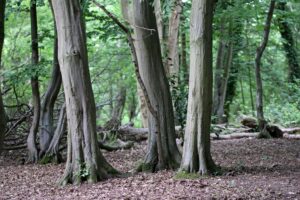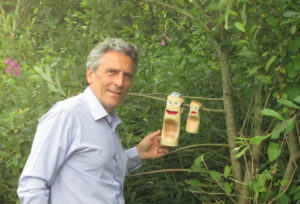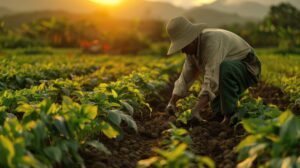Author, woodcarver and recycler Richard O’Neill on one of the forgotten sustainable communities and what we can still learn from them.
Over half a century ago I lived with my family in a caravan and followed a totally nomadic and low impact lifestyle as our ancestors had done for the previous 450 years in the UK.
It was sustainable, inter-dependent and part of a circular economy – my family provided goods and services to those who needed them, buying or trading for what they needed in return whilst living very closely to and in harmony with mother earth, until the first wave of conspicuous consumerism raised its non-too-pretty head in the 1960’s.
First to go was the call for traditional wooden crafts, simple things like clothes pegs and brushes being replaced by cheaper imported plastic versions, next to go was our traditional stopping places, taken for housing booms and road widening schemes. Some might say ‘well that’s progress’ and they may have a point, but it appears that progress is not all it’s cracked up to be when we see what we have done to the world under the guise of progress.
I believe it’s time to ask some serious questions of progress, is it progress to keep building bigger and wider roads and spending less on trains and canals, is it progress in the face of growing homelessness to keep building 6 bedroom luxury houses for two people that local people can’t afford, is it progress to produce so much stuff that we need to build large storage facilities to keep it and large landfills and incinerators for when we no longer keep it? Is any of this a progression for nature? Despite people in developed and developing countries becoming materially richer, nature is paying the price for it and, of course, ultimately, we all do by becoming considerably poorer in terms of air and water quality (we need those to survive) and health and well-being (we need that to fully enjoy life). There’s a growing belief backed by science that we are now at a critical point and if we don’t address and reduce the damage we’re doing to the planet it will be unrepairable and have huge consequences for us and future generations.
Going back to the earliest of greens those nomadic people, the question is often raised ‘What did they ever do for us?’ They showed us that you could make a living from nature whilst looking after it, that if you continued to plant more trees than you used to make your products you would never run out. They showed us that if you understood plants, you would know which ones were edible and which were medicinal, they showed us new methods of animal husbandry and agriculture particularly fruit growing. They showed us that you didn’t need to fill your life with possessions, they showed us that the goal was to work to live and not the other way around and you need a lot less than the advertising companies will have you believe.
Once again, we’re seeing a huge and growing interest in learning what some called forest or survival skills which are fabulous especially for children for allowing them to see the benefits of understanding the wonder of nature and how to work with it. I take these skills one step further and teach about the mindset and philosophy of what I call the Nomadic Way, ancient wisdom for sure, but perhaps even more relevant today.
As the old people used to say, ‘Sometimes you have to go back before you can go forward,’ nature knows that and we would do well to know it too.
Richard O’Neill is an author, educator and traditional wood carver who grew up in a nomadic family in the UK he is the founder of Lumberjunkers a recycled timber furniture and education project. https://richardthestoryteller….


